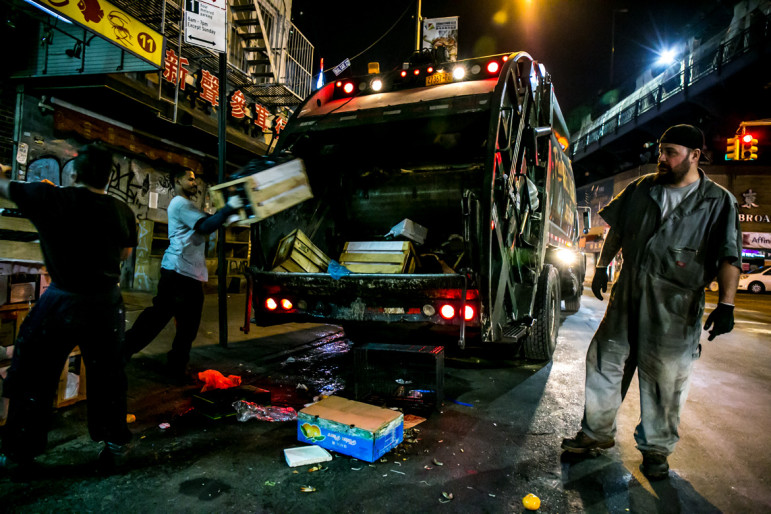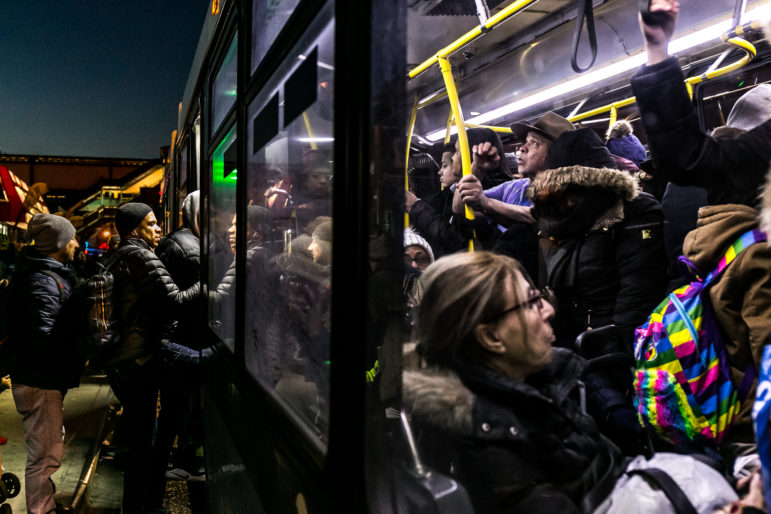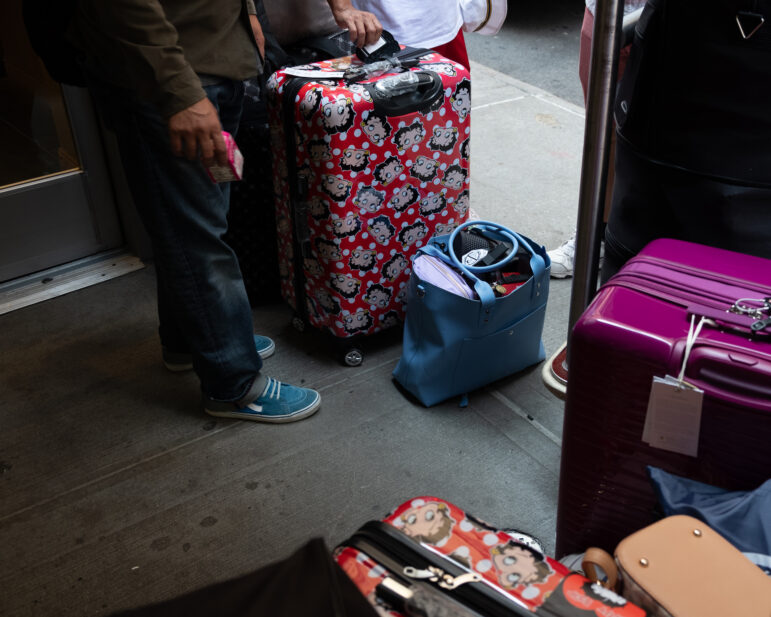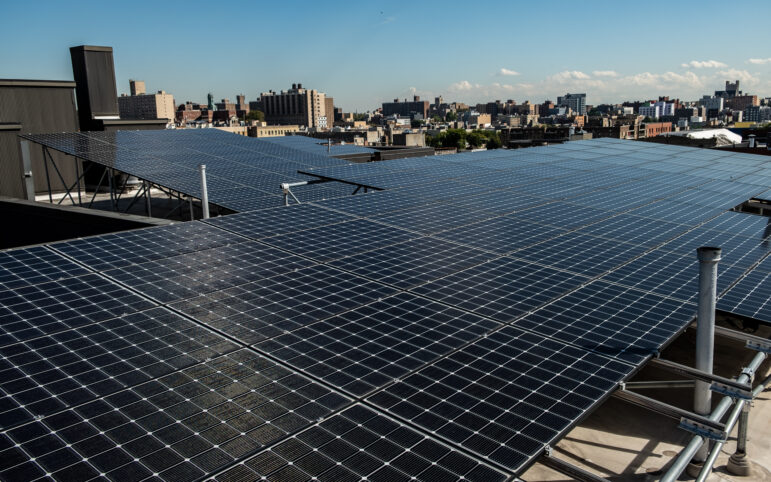The first door is the worst door for volunteer canvasser David Schwartz. “If you want to get somewhere in life,” opines the gruff man who answered the door, after pulling up to his attractive Yonkers house moments earlier in a Jaguar, “you work your ass off. You work four jobs like me and two jobs like my wife.” Slam.
A few doors down Lee Avenue, a woman wearing massive, multidiamond rings on each hand is more welcoming. “It’s about time,” she says warmly as she takes a blank sheet of paper from Schwartz and pens a quick note to Republican State Senator Nicholas Spano. A guy around the corner does likewise. “Dear Sen. Spano,” he writes. “Taxes, prices, living go up, and wages don’t! It’s inhuman and unfair!” Please raise New York’s minimum wage, 10 letter-writers implore Spano over the following two hours.
Schwartz, a retired schoolteacher, is gathering these letters to Spano from voters from a “swing” area of Yonkers–split, quite evidently, between Democratic and Republican voters. While New York state legislators have more job security than just about anyone these days, Spano has the prospect of a Democratic challenger to worry about as presidential voters flock to the polls this November. The Working Families Party, of which Schwartz is a devoted member, is taking full advantage of the competition as it campaigns to raise New York’s minimum wage. “It’s very encouraging,” says Schwartz. “In that kind of neighborhood and community, for 10 people to sign the letters says good things about the future of our movement.”
If you live in a Democratic State Senate district and know about this campaign, which seeks to raise the bottom-rung wage from $5.15 to $7.10 an hour, it’s probably because you read the Daily News, which has launched a fierce series of editorials and news stories pushing for a hike (and hounding Cardinal Edward Egan to follow through on a pledge to support it, too). Editorial pages from Ithaca to Staten Island have done the same.
But you probably haven’t witnessed a force whose efforts could be every bit as important to ensuring the bill’s passage. The Working Families Party has been mounting a complex organizing effort across New York State, enlisting labor, community and religious groups to convince Republican state senators to support a minimum wage hike. It shows a side of the Working Families Party that’s less well known than its presence on New York State Ballot Line E–but quite possibly more influential.
Organizers and demonstrators from Working Families and its partners have shown up on doorsteps, at YWCAs, at Grand Central Station. Groups in counties across the state have been picketing, gathering religious leaders to press senators on a moral case for action and holding packed “accountability sessions” demanding that senators sign on to the bill. Spano, for one, expressed genuine surprise that more than 150 activists turned out to a Yonkers accountability session. “I thought 20 people” would come, he told them, shortly after signing a pledge to “do everything in my power to make sure the bill passes.”
Professional community organizers make up about half of the Working Families Party’s staff of 15, according to Bill Lipton, a former tenant organizer who has headed organizing operations since the party was founded in 1998. “We’ve always stressed that we need to marry organizing with electoral politics,” says Lipton. “We have a labor tradition and a community organizing tradition. We have affiliates who are already organized and have leaders who have weight, plus the grassroots energy of individuals.” What’s more, it’s a coordinated statewide enterprise–extremely rare in New York, where upstate and downstate, city and suburb, are almost always pitted against one another in politics.
Lipton and campaign organizer Eva Bonime are focusing on state senate Republicans because, thanks to extremely restrictive rules and procedures, only members of that majority party have any hope of getting their bills to come to a vote–and they still need the blessing of Majority Leader Joseph Bruno. As of mid-March, 13 Republican senators, including Spano, had signed on as co-sponsors of a bill introduced by Bronx Senator Guy Velella. Ten others, Working Families organizers claim, either have supported a minimum wage hike in the past or have agreed to back a bill if it comes up for a vote. Together with Democratic votes, this would add up to a veto-proof majority.
The objective: Put the squeeze on Bruno, the one man who stands in the way. The tactic: Scare the bejeezus out of Republican senators who may be vulnerable to Democratic challengers this fall, and make Bruno scared that his party could lose majority status. Among the more vulnerable this year are Spano, Olga Mendez of Manhattan, Brooklyn’s Marty Golden and Long Island Senator Carl Marcellino. (Velella is a special case: He’s under indictment for bribery, and should he be convicted, it’s quite likely his district will go to a Democrat.)
By contrast, the two major groups lobbying against the bill–the New York Farm Bureau and the National Federation of Independent Business–are playing strictly by the Albany book. They lobby, they send emails, they write op-eds–and they count on Bruno to accommodate them. In March, the Farm Bureau had several hundred of its 35,000 members show up in Albany. The business federation, with 20,000 members, says it simply has them send letters.
These opponents counter labor’s moral pleas and populist pressure with a message crafted to resonate loudly in depressed counties upstate: Raising the minimum wage would lead to more job losses, which poor people can least afford. “New York’s businesses and economy are already struggling,” says Mark Alesse, state director for the business federation. “It’s piling onto an already bad situation.” Alesse and other business leaders say a better way to help workers is to expand state supports like the Earned Income Tax Credit.
Here’s how the Daily News editorial page, hardly a liberal organ, responds: “A higher minimum doesn’t cost jobs. It does help the economy by putting more money into the pockets of those most likely to spend it. Our neighbors–and competitors–understand that. That’s why Connecticut’s minimum of $6.90 an hour will go up to $7.10 next month. Massachusetts has a minimum of $6.75.”
Now that he’s being pushed from all sides, will Bruno finally budge? We’ll see how this year’s sure-to-be-brutal Albany legislative horse-trading goes. But the impact of an organizing effort like Working Families’ is perhaps best measured over the long term–in helping create a political culture that makes it possible for ordinary citizens to get directly involved in advocating for their interests, and where it’s perfectly normal for someone from your community to come to your door and talk about the plight of poor workers.
“Speak now or forever hold your peace,” is how Bianca Pereira of Yonkers sees her own commitment to the campaign. She got involved after an organizer visited her former place of work, a Family Dollar store on South Broadway. Pereira now speaks at Working Families-sponsored public events about her experiences.
In the 1980s, Pereira says, she used to work in the executive restaurant of Chase Manhattan Bank in lower Manhattan and made $16.50 an hour. Then she moved to San Diego, and found that $7.50 an hour was the best she could do there. “After 14 years, I came back,” she says. She expected to find decent work on the East Coast but ended up making only $6 an hour, with no health insurance. “What happened?”








